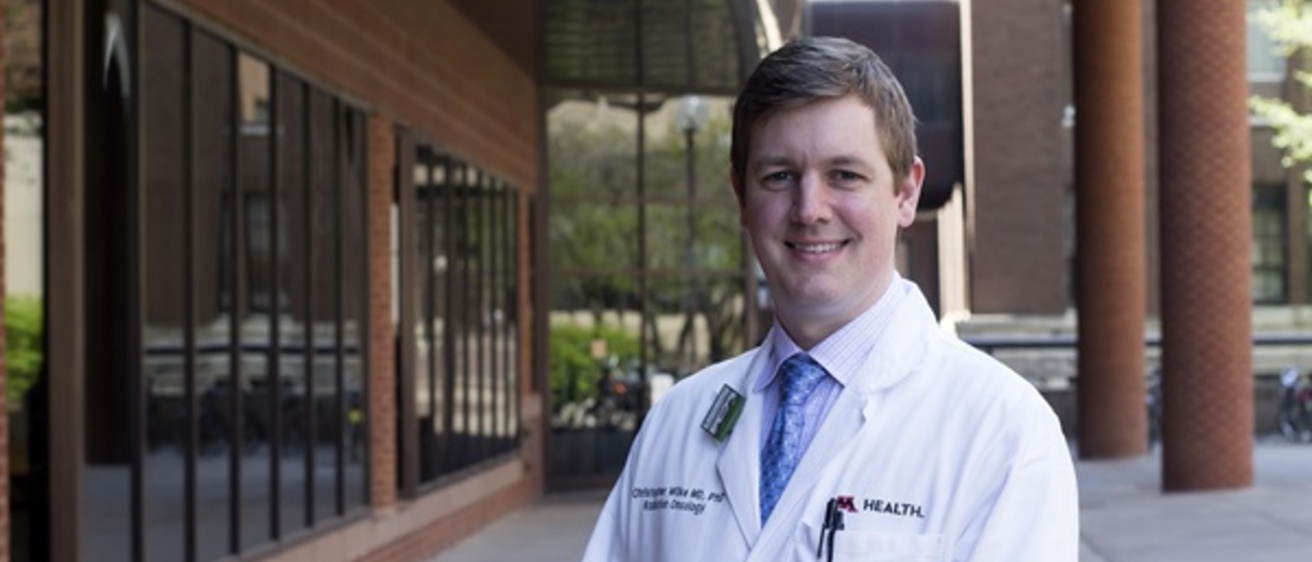Radiation therapy is often an essential part of cancer treatment. And it is radiation oncologists like Chris Wilke, MD, PhD, who partner with other cancer experts to plan and carry out that therapy for patients.
Wilke recently joined University of Minnesota Health Cancer Care. He focuses on the treatment of tumors of the head, neck and spine. Wilke received a PhD in biomedical engineering and completed medical school and residency at the University of Minnesota.
Recent improvements in medical technology are helping Wilke and other radiation oncologists deliver precise doses to tumors while minimizing the risk of harm to other parts of the body. We asked Wilke to tell us more about the trends within his field, and his interest in treating brain and spinal cord tumors.
What is a radiation oncologist?
We are cancer specialists who focus the delivery of radiation therapy to eradicate cancer. I am one member of a comprehensive treatment team that includes specialists in radiology, pathology, medical oncology, and other surgical sub-specialties. Radiation oncologists help identify cancer patients that could benefit from radiation therapy, and then plan and carry out that treatment.
What is your approach for the treatment of brain and spinal tumors?
I focus upon the treatment of head and neck, brain and spinal tumors. These can be particularly challenging because they are near many critically important components of the body. Thus, each patient’s treatment plan is highly individualized and includes a thorough mapping of the location that will receive radiation therapy so that we can eradicate the disease while sparing healthy tissue around the cancer from the potentially severe side effects of therapy.
By nature, my work is very collaborative. I partner with my University of Minnesota Health colleagues across multiple disciplines to develop an optimal evidence-based care plan for each of our patients. Within my department, I also work with a team of outstanding and experienced nurses, radiation therapists, dosimetrists and physicists to deliver complex radiation therapy treatments while caring for the unique needs of our patients under therapy.
Why are you passionate about your work?
As a physician-scientist, my research interests include the use of medical imaging—particularly brain imaging—to deliver precision cancer therapies. I’m also fascinated by the possibilities of 3-D printing.
Our research lab is currently exploring the creation of 3-D printed materials and devices that will boost the effectiveness of radiation delivered to tumors while shielding sensitive organs nearby. The creation and use of innovative medical technologies to help my patients is an incredibly rewarding aspect of my work
What do you see as potential future developments in the field?
Technological innovation will continue to help radiation oncologists deliver more precise and accurate therapy to tumors while better protecting other parts of the body from radiation-related complications. With spinal tumors for example, we are able to deliver high doses of radiation therapy to the tumors while minimizing the risk of harm to the spinal cord.
At the same time, rapid advances in a variety of fields spanning the biological and physical sciences will help us to better understand tumors, predict their pattern of spread and enable us to deliver patient-specific cancer therapy by ushering in the era of “precision medicine.”
Why do you enjoy working within the University of Minnesota Health community?
I enjoy working with my exceptionally talented colleagues across a spectrum of medical specialties. We have a close-knit team that provides exceptional care to the people in our community, the state of Minnesota and beyond. Being situated on a research-heavy Big 10 campus at the University of Minnesota also gives me access to world-class experts in a bevy of other fields outside of medicine. Together, we can leverage our research and expertise to answer the questions we face in clinic today to make lasting, positive change to the healthcare of tomorrow.
https://www.mhealth.org/blog/2018/may-2018/radiation-oncologist-christopher-wilke-helps-advance-the-field
